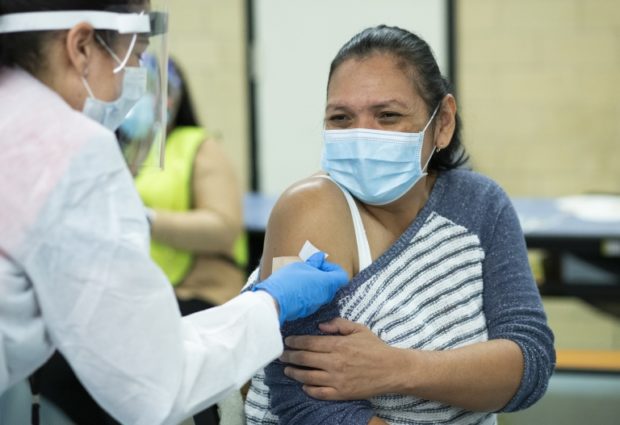COVID-19 impacts life expectancy in US, especially for Latinos

In this file photo taken on Jan. 10, 2021 a woman receives a dose of the Moderna coronavirus disease (COVID-19) vaccine at a vaccination site at South Bronx Educational Campus, in the Bronx New York. Image: AFP/Kena Betancur via AFP Relaxnews
The COVID-19 pandemic is expected to have a significant impact on life expectancy in the United States, a country which counts almost 340,000 deaths linked to the virus in 2020. Now, researchers in the U.S. estimate that life expectancy at birth could be shortened by over a year, with Black and Latino populations more particularly affected.
Researchers from the University of Southern California and Princeton University studied the impact of COVID-19 on life expectancy in the U.S., which they consider to be a significant indicator of a population’s health and an informative tool for examining the impact of COVID-19 on survival. Published in the journal Proceedings of the National Academy of Sciences (PNAS), their projections place the expected drop in life expectancy at birth for Americans due to the COVID-19 pandemic at 1.13 years to 77.48.
While these are still currently just projections, the researchers state that this represents the largest single-year decline in life expectancy in at least 40 years, and the lowest life expectancy estimated since 2003.
Minority populations more greatly impacted
The study also suggests that declines in life expectancy are likely to be even starker among minority populations, particularly Blacks and Latinos. The scientists predict a 2.10-year drop in life expectancy for Blacks, to 72.78 years, and a 3.05-year drop for Latinos, to 78.77 years, compared to 0.68 for white Americans, whose life expectancy would fall to 77.84 years.
“The COVID-19 pandemic’s disproportionate effect on the life expectancy of Black and Latino Americans likely has to do with their greater exposure through their workplace or extended family contacts, in addition to receiving poorer health care, leading to more infections and worse outcomes,” explains Theresa Andrasfay from the University of Southern California.
These estimations envisage a widening of the gap in terms of life expectancy between Blacks and whites in the U.S., rising from 3.6 years to over 5 years. The gap had actually been closing in recent years. Latinos, on the other hand, who have consistently experienced lower mortality than whites, would see this gap reduced due to COVID-19.
“The huge decline in life expectancy for Latinos is especially shocking given that Latinos have lower rates than the white and Black populations of most chronic conditions that are risk factors for COVID-19. The generally good health of Latinos prior to the pandemic, which should have protected them from COVID-19, has laid bare the risks associated with social and economic disadvantage,” analyzes Noreen Goldman of the Princeton School of Public and International Affairs. The researchers also point to “persistent structural inequalities that heighten risk of exposure to and death from COVID-19.”
Could vaccination reverse the trend?
While more than 10 million Americans have already received their first dose of COVID-19 vaccine, the researchers consider that this vaccination campaign may not be enough to immediately reverse the impact of the disease on life expectancy in the U.S.
“While the arrival of effective vaccines is hopeful, the U.S, is currently experiencing more daily COVID-19 deaths than at any other point in the pandemic. Because of that, and because we expect there will be long-term health and economic effects that may result in worse mortality for many years to come, we expect there will be lingering effects on life expectancy in 2021,” Andrasfay concludes. JB
RELATED STORIES:
Initially severe COVID-19 may not be associated with ongoing symptoms — study